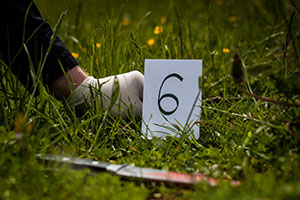Forensic experts offered key testimony in the murder trial of David Eisenhauer. Eisenhauer, 20, of Columbia, Maryland was charged with first-degree murder, abduction, and concealing a body in connection with the homicide of 13-year-old Nicole Madison Lovell. His co-defendant, Natalie Marie Keepers, who is accused of helping to plan the murder and conceal the body, is being tried at a later date.
Eisenhauer and Keepers were freshmen at Virginia Tech at the time of Lovell’s murder. After Lovell’s disappearance, her father found her usernames and passwords written on her wall. FBI computer forensic experts traced Lovell’s account information and found that she had been communicating with David Eisenhauer over the anonymous chat app, Kik. When Eisenhauer was questioned in connection with Lovell’s disappearance, he admitted to meeting Lovell online and exchanging messages with her. He told investigators that he thought that she was 16 or 17 and when they met in person on January 27 he saw “someone who is maybe 11 years old climb out of a window” and thought “uh-uh, not for me” and that he left without her. Three days after Lovell’s disappearance, her body was found in nearby Surry County, North Carolina.
Expert Witnesses
At trial, prosecutors presented numerous expert witnesses to strengthen their case against Eisenhauer.
Deena Jones of the Blacksburg Police Department testified on behalf of the prosecution. Jones served as an intelligence analyst at the time of the homicide. Jones was charged with extracting the GPS data from the Garmin device that was in Eisenhauer’s possession to show his route over January 26, 2016 and January 27, 2016. Jones testified that Eisenhauer’s GPS showed that he traveled from the Virginia Tech campus to Target and Walmart, to Blacksburg, to Craig Creek Road, and then back to campus.
Nicole Harold, forensic science supervisor for the Virginia Forensic Department, testified that she compared DNA from possible pieces of evidence to compare them with DNA from Eisenhauer, Keepers and Lovell. Harold testified that it was overwhelmingly likely that Lovell’s blood was found in a clearing in the wood and that there was high probability that it was Lovell’s blood in Eisenhauer’s car and on the blanket, stick, underpants, boot, and shovel that were taken from Keepers. Harold also testified that evidence showed that cleaning fluid had likely been used on some of the items, which would explain why some DNA evidence was not able to be conducted. Harold testified that the DNA that was found on Lovell’s fingernail clippings taken during her autopsy belonged to Eisenhauer.
Cory Barote, a forensic scientist specializing in latent prints at the Virginia Department of Forensics Science, testified that he analyzed fingerprint and palm cards in conjunction with latent prints taken from the evidence. Barote testified that a container of disinfecting wipes found in Eisenhauer’s trunk contained Eisenhauer’s prints and that a shovel and wipes found in Eisenhauer’s backseat and a plastic Walmart bag found in a Virginia Tech dumpster had prints belonging to Keepers.
On the day following expert testimony, Eisenhauer switched his pleas to no contest and was convicted of Lovell’s murder. Eisenhauer faces a maximum sentence of life plus 15 years in prison.




